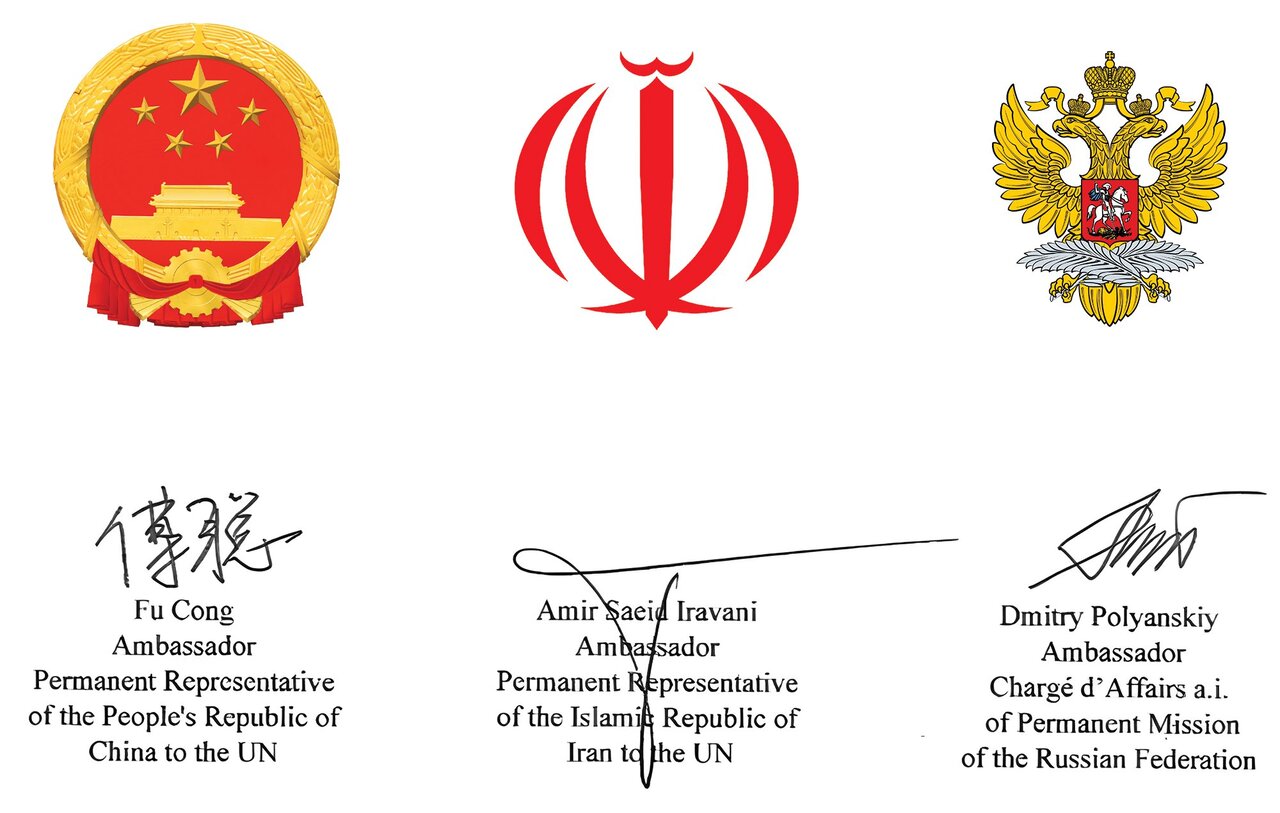A shifting world order: Iran finds broad support in nuclear dispute with West
In letter to UN chief, Iran, Russia, and China say expiration of Resolution 2231 marks end of UNSC monitoring

TEHRAN – Iran, China, and Russia have once again joined forces to prevent the implementation of pre-JCPOA UN sanctions against Tehran, which were officially re-instated last month but have yet to bear practical fruit due to growing international opposition.
The UK, France, and Germany triggered a mechanism called the ‘snapback’ on August 28, setting in motion a 30?day process to restore all UN sanctions on Iran. The snapback mechanism was part of the 2015 Iran nuclear deal (officially the Joint Comprehensive Plan of Action or the JCPOA) which allowed non-Iranian signatories to bring back UN sanctions if they deemed Iran to be non-compliant with its commitments.
In a Saturday letter to UN Secretary General Antonio Guterres, Iranian, Russian and Chinese representatives at the UN said Europe’s decision to trigger the snapback lacked any legal foundation.
“Efforts by the three European countries to invoke the so-called ‘snapback’ mechanism are legally defective and lack any legal basis,” read the letter addressed to Guterres as well as Vassily Nebenzia, whose country holds the rotating presidency of the UN Security Council. “The three European countries, which themselves have reneged on their commitments under [UNSC] Resolution 2231 and refused to comply with the trend set in the ‘dispute settlement mechanism’ are not competent to refer to its provisions,” the letter added.
The JCPOA, signed by Iran, Germany, Britan, France, China, Russia, and the United States, was designed to limit Tehran’s nuclear activities in exchange for sanctions relief. The embargoes which had been straddling Iran’s economy since 2006, reached their peak under the Obama administration in 2012.
When Republican Donald Trump succeeded Obama, however, the U.S. withdrew from the pact and reimposed sanctions against Iran. In 2018, Trump also came up with secondary restrictions that imposed unprecedented financial pressure on the Iranian people. Despite repeated promises to rescue the deal, European signatories failed to take the sting out of U.S. sanctions in the years that followed.
Iran began to scale-back on some of its JCPOA commitments in 2020 as it became clear that Westerners were not seeking to hold their side of the bargain. It meanwhile, engaged in multiple rounds of negotiations, saying that if the West lifted the sanctions, it would be willing to rein in its nuclear activities. Iran's last diplomatic effort failed in June 2025 when Israel and the U.S. launched attacks on its nuclear, civilian, and military infrastructure, just days before a new round of talks with the U.S. was scheduled to convene in Oman.
Beyond the fact that Iran was compelled to scrap some of its commitments after the West abandoned its own, Iran, Russia, and China stated in their letter to the UN chief that the expiration of Resolution 2231 provides further reason why the snapback of UN sanctions cannot be implemented. Resolution 2231, the UN resolution endorsing the JCPOA, expired on October 18 after 10 years.
“Under operative clause 8 of Resolution 2231, all of its provisions were terminated after October 18, 2025. Once again, we reiterate that the full and prompt termination of Resolution 2231 amounts to the end of reviewing Iran’s nuclear issue at the UN Security Council, something which would reinforce the power of the council and the credibility of multilateral diplomacy,” the letter added.
While the backing from major global powers Russia and China is significant, at least 120 other nations have also supported Tehran in its nuclear dispute with the West. Members of the Non-Aligned Movement (NAM) voiced support for the Islamic Republic during a ministerial meeting that took place in Uganda last week.
"We clearly see a rift in the international order here," said Shuaib Bahman, a political scientist. "Iran's nuclear program has become one of the biggest points of contention between world powers since the end of WWII. Also, the situation and perception of Iran are significantly different than in 2012, when most of the world agreed with Obama's handling of the nuclear issue."
Iran's commitment to diplomacy and the West's blatant disregard for international accords over the past 10 years have shifted perspectives around the world, he added. "Russia and China, wielding considerable power in the UNSC, can still impede the practical implementation of the snapback, even though they legally couldn’t prevent its invocation. Consequently, other countries will also be reluctant to enforce UN sanctions when it comes to their bilateral relations with Iran."
